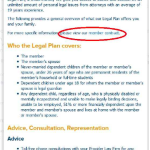
The “Browsewrap”/”Clickwrap” Distinction Is Falling Apart
It is somewhat surprising that, in 2015, courts are still hashing out online consumer contract formation issues. After all, the seminal case, Specht v. Netscape, was decided over a dozen years ago. Yet, a few recent cases show that companies often don’t…

Hoang v. IMDb Argued in the Ninth Circuit
Hoang vs. IMDb, a case we’ve covered closely on the blog, had oral arguments before the Ninth Circuit panel last Friday. The appeal focused on several procedural issues, such as: whether the district court improperly placed the burden on Hoang to…

Top 10 Internet Law Developments of 2014 (Forbes Cross-Post)
It’s time for my annual recap of the top Internet Law developments of the year. #10: Copyright Fair Use Tilts To Defense. Larry Lessig has famously said that “fair use in America simply means the right to hire a lawyer…

Lawsuit Fails Over Ridesharing Service’s Disclosures To Its Analytics Service–Garcia v. Zimride
Plaintiff sued Lyft (and others) over privacy violations based on the allegedly improper disclosure of user information by the Zimride service. He alleged that he used the Zimride service, once owned by Lyft and now owned by Enterprise Holdings, and his…
Court Rejects VPPA Claim Against Viacom and Google Based on Failure to Disclose Identity
I blogged before about the privacy lawsuit against Viacom and Google over the disclosure of the viewing habits of minors. The court previously rejected the claims on the basis that the disclosure of user attributes (such as demographic information, unique…

No Personal Jurisdiction Over Nasty Facebook Post–Burdick v. Superior Court
Let me see if I can sum up all of my knowledge about Internet jurisdiction in a few pithy bullet points: * Motions to dismiss for lack of personal jurisdiction often lose, so why should we get too wrapped up…

Safeway Can’t Unilaterally Modify Online Terms Without Notice
This is a lawsuit against Safeway alleging that it charges slightly different (and higher) prices for items ordered online than purchased in-store. The court previously denied Safeway’s motion to dismiss and now grants summary judgment in favor of plaintiffs on…

Appeals Court: Accepting Lawyer’s Prove-me-Wrong Challenge Does not Form a Contract
This is a great case where a defense lawyer made a passing statement that his client could not have committed a murder he was charged with due to the sheer impossibility of traveling logistics. The Defendant was spotted via surveillance…

eBay Isn’t Liable for Selling Recalled Merchandise–Hinton v. Amazon
Due to Section 230, eBay generally isn’t liable when its merchants sell problematic goods. I believe the earliest ruling establishing this proposition is Stoner v. eBay, a 2000 case over bootleg recordings. More recently, in 2011, a court held that…

Creditors Can’t Seize Country Code Top Level Domains
This is a ruling addressing plaintiffs’ ability to levy against a country code top level domain (TLD). Plaintiffs obtained judgments against the Islamic Republic of Iran, Democratic People’s Republic of Korea, and Syrian Arab Republic. They sought to attach defendants’…
